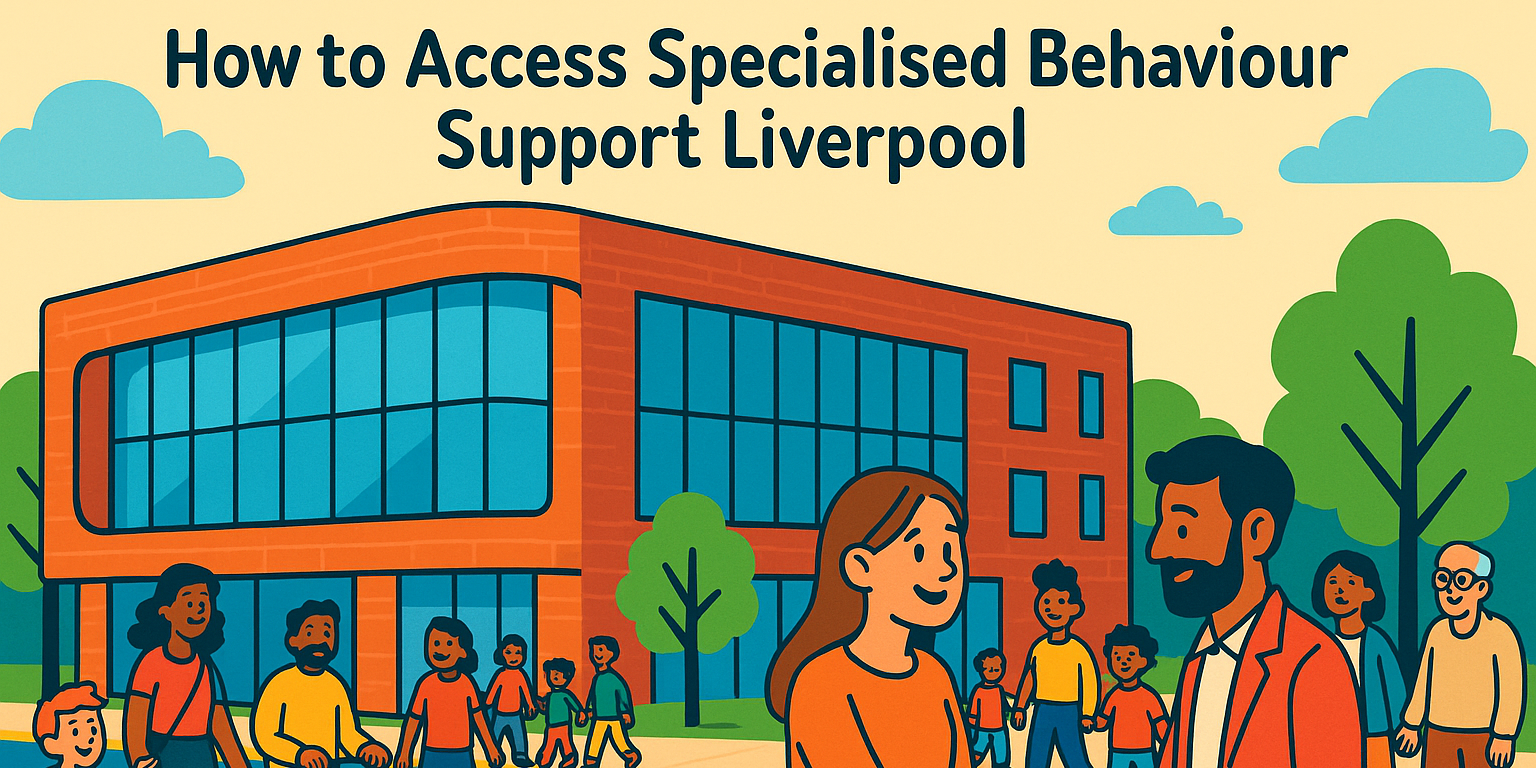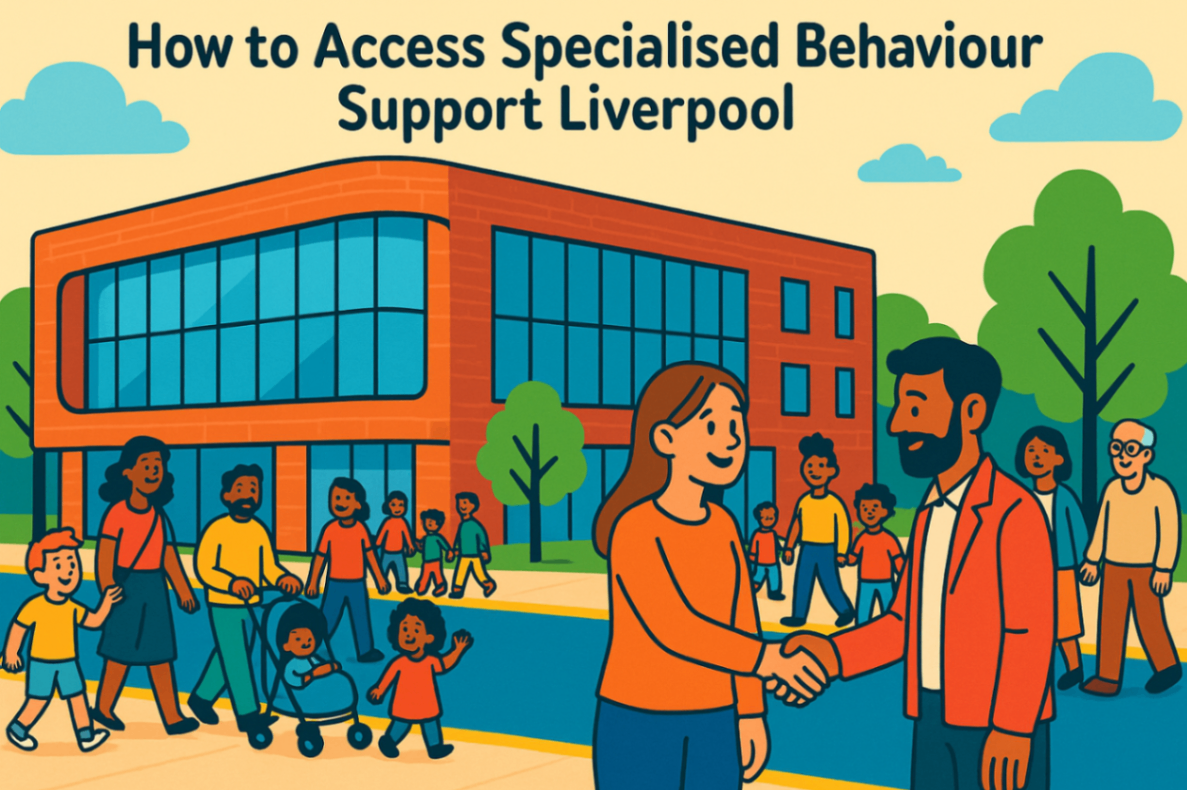
how to access specialised behaviour support in liverpool
21 July, 2025
Finding your way with specialist behaviour support can make a big change for people and families dealing with hard behaviour challenges. These services use proven ways that help to make life better and support good moments between people. They focus on types of behaviour that worry you, and use plans just for you or your family. This means families can feel less stress and get more done in their day. Specialist behaviour support is planned for the person it helps. It will guide them to new ways to handle their feelings and helps build an environment where everyone can grow and stay steady. Are you ready to know more about how to get these services in Liverpool? Keep reading!
Key Highlights
-
Specialist behaviour support is vital for addressing challenging behaviours and promoting positive change, particularly among individuals with complex needs.
-
Positive behaviour strategies aim to improve the quality of life for individuals and their carers by fostering meaningful interactions and reducing restrictive practices.
-
Families can access services through the NDIS, which provides funding for tailored behaviour support interventions.
-
Qualified behaviour support practitioners create behaviour plans that target specific behaviours of concern while aligning with individual needs.
-
Support services encourage reflective practices to ensure sustainable and long-term positive outcomes.
Understanding Specialised Behaviour Support in Liverpool

Specialised behaviour support in Liverpool is important to help find and manage challenging behaviour. These issues may come from mental health problems or things around us. The main goal is to learn why these behaviours happen and use the right steps to deal with them.
When you get professional help, specialist support services can deal with many behaviour challenges. They help bring about good changes in behaviour and give people the tools they need for a better quality of life. Families in Liverpool can use these services to lower stress, make their relationships better, and bring peace at home.
This support can give you and your loved ones a way to deal with behaviour problems. It can also help make every day better, leading to improved quality of life for both the person in need of help and their family. In this way, behaviour support makes a real difference.
If you're still unsure about what makes behaviour support "specialised", this guide on specialised behaviour support for children in Liverpool breaks it down clearly for parents.
What Makes Behaviour Support ‘Specialised’?
Specialised behaviour support is about more than using general methods. It looks at the unique, complex needs each person has. Unlike normal strategies, specialist services bring in evidence-based plans, like Positive Behaviour Support (PBS), that help bring positive change. This work often uses reflective practices, so there is always checking and adjusting as needed.
People who focus on behaviour support make plans just for each person. They look at what challenges they have and try to help in the best way. These plans work to lower restrictive practices, help people handle things better, and help build positive behaviour that makes daily life better.
Specialist support is put in place step by step and with care. Practitioners work closely with carers to figure out what is going on. They look carefully at behaviour patterns, so they can find and fix the cause of concern. This way, interventions really help and keep working over time. These ideas let people have better days, help families, and lead to the best outcomes for everyone.
Does My Child Need Specialised Behavioural Support?

Figuring out if your child needs specialist behaviour support means you have to notice changes in their behaviour over time. When a child often has tantrums, acts out, or suddenly stops wanting to be around others, it may be a sign of a problem. These things can happen because of changes at home, problems at school, or a possible developmental issue.
If your child shows certain behaviour that gets in the way of having a good and meaningful life, it may be time to look for help. Things like not listening to instructions or having trouble with their feelings can make daily life harder for them and the people around them, so it is important to act.
Bringing in a specialist for behaviour support can have a good impact on your child’s quality of life. Getting help early teaches children practical skills so they can get through tough times, making sure small problems don’t turn into bigger ones. Carers are very important in noticing problems first and helping the child grow in a good way, giving them what they need for a healthier and happier life. Before starting the access process, it helps to know if your child may need this type of support — here are some common signs children might benefit from specialised behaviour support.
Behaviour Support Services
Behaviour support services in Liverpool are run by people trained to help others. These behaviour support practitioners make behaviour support plans that fit each person’s needs. The aim is to solve certain behaviour problems and help people find better ways to do things in daily life.
Behaviour support practitioners also give supervision on a regular basis. This helps make sure the right steps are used in a safe way. They look at each person's situation and can work closely with carers. Their work leads to better long-term results. These services help both people and their carers have more balance and do better each day.
Eligibility Criteria and Referral Process
Accessing behaviour support services means you have to meet some set rules and follow steps for referrals. People who are in the NDIS can often get these services, and they focus on helping people have the best outcomes with their behaviour.
People are usually eligible if they have behaviours that cause problems in their lives or stop them from having a good routine. Family, carers, or an organisation can start referrals, which helps you get to the specialist support that fits these complex needs.
|
Referral Steps |
Eligibility Requirements |
|---|---|
|
Contact support organisation |
Behaviours that affect daily life or relationships |
|
Submit referral or online questionnaire |
Be a NDIS participant or meet the service's own criteria |
|
Initial assessment |
Learn about challenges with a thorough evaluation |
This method uses a clear process so everyone gets the support that is just right for them. It helps make positive behaviour changes and better quality of life in the long run.
Navigating the NDIS and Funding Options in Australia
The NDIS helps make it easier to get behaviour support services. It does this by giving funding choices to meet what each person needs. Positive Behaviour Support (PBS) is often part of NDIS plans. This way, people can get the help that is right for them.
Key NDIS funding options are:
-
Direct funding for behaviour support plans from qualified practitioners
-
Money help for therapy, supervision, and important steps for change
-
Resources for using PBS strategies at home or in the person’s own space
To get this funding, people need to show that these supports fit well with what they want and what is hard for them. With the right money and support, families can get special services. This can make their loved ones’ quality of life better. Working together with organisations can also make it easy to get funding and keep the service the same for everyone.
Steps to Access Specialised Behaviour Support in Liverpool
 Knowing the steps to get help from a specialist helps families find their way through the system more easily. Start by looking for any behaviours that keep coming back, as this is a sign you may need help. After that, contact an organisation or someone who works with Positive Behaviour Support (PBS).
Knowing the steps to get help from a specialist helps families find their way through the system more easily. Start by looking for any behaviours that keep coming back, as this is a sign you may need help. After that, contact an organisation or someone who works with Positive Behaviour Support (PBS).
To make a referral, you will usually need to fill out some forms or answer questions. This helps the organisation see what behaviours need attention. After the referral, there will be a first meeting to talk about your needs. Then, they make a plan to help. In the sessions, you will learn practical skills to help with positive change.
It is important to be consistent if you want good results. Try to be involved in everything and keep in touch with the professionals you work with. This way, you and they can check on progress and make changes to the plan, if needed. Taking these steps helps your family move towards a better and more stable life. Once you've secured NDIS funding, your child’s Positive Behaviour Support plan will be customised — find out how PBS strategies are personalised in real support plans.
Why Liverpool Families Trust Us for NDIS Behaviour Support
Families across Liverpool, Casula, Moorebank, Lurnea, Hoxton Park, Prestons, and Wattle Grove turn to us for personalised, evidence-based behaviour support under the NDIS.
We specialise in helping children and young people with challenging behaviours through Positive Behaviour Support (PBS). Our approach combines proven strategies with warm, practical support—so both participants and carers feel understood, empowered, and supported every step of the way.
From your first contact, you'll notice the difference. We listen, we tailor support to your child’s needs, and we guide you through every stage of the NDIS process with compassion and clarity.
Ready to make progress with a trusted local team? Book your consultation now to get started.
Conclusion
Getting access to specialised behaviour support in Liverpool is important for families who need personal help for their child. Knowing what your child needs and looking at all of the services that are out there can help your child do better and feel better. If you follow the steps and use the resources, you can feel sure as you start this process to get the right support. Always put your child's needs first and look for professional behaviour support. This is not just a choice, it is a way to help your child in the future. Want to see how this support works in real life? Here’s how specialised behaviour support in Liverpool connects families, schools, and therapists to deliver consistent progress.
Frequently Asked Questions
How do I know if my child or family member needs specialised behaviour support?
If someone you care about shows tough behaviours like anger or pulling away from people, and it affects their quality of life, specialist behaviour support can help. Carers need to get advice if these kinds of behaviours stop a person from doing things each day or make them upset.
What is the difference between general and specialised behaviour support?
Specialist behaviour support helps people with complex needs. It uses ways that make people look back at what happened and learn from it. Support plans are made to fit each person. General support helps with bigger problems, not just one person’s needs. Special help is used to get the best outcomes for people who deal with tough behaviours.
Can I access services without an NDIS plan?
The NDIS gives money for help with behaviour support. Still, there are some organisations that provide services on their own or as another choice. Carers or healthcare providers can give referrals. This can help people learn about options, such as Positive Behaviour Support (PBS), that fit what each person needs best.
How long does it take to start receiving support after referral?
Waiting times after getting referred can be different, depending on who can get help and how many people need it. Usually, support starts after the first meeting with one of the behaviour support practitioners. The organisations want to give the right support as soon as possible. This way, they can deal with any behavioural challenges well.
What should I expect in my first behaviour support session?
Your first session will have you meet with the behaviour support team. They will talk to you to find out about the hard behaviours and help set some goals. In this session, you will work on learning practical skills. The team will also help you make a Behaviour Support Plan. This plan is there to help you see positive change and make your quality of life better.
.svg)

















